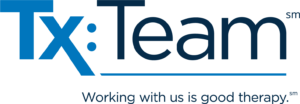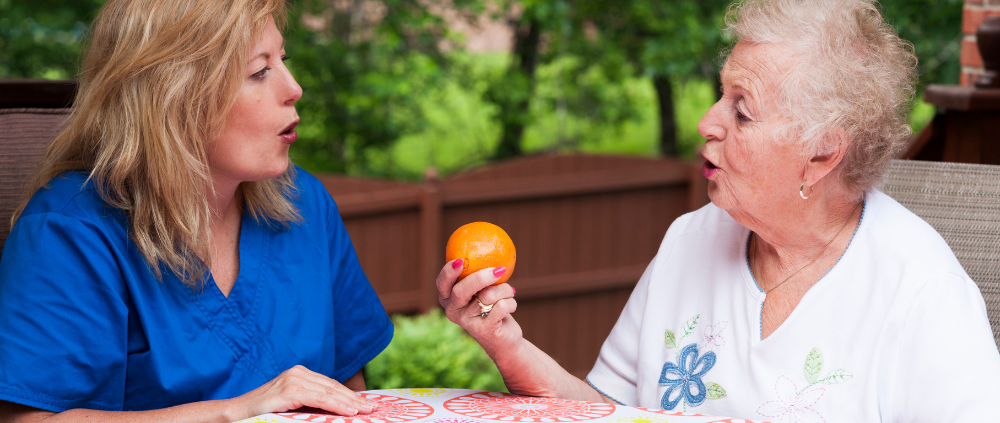Rehabilitation for Stroke Survivors: Speech and Motor Recovery
May is National Better Speech & Hearing Awareness Month, and we thank all Tx:Team Speech-Language Pathologists for their continued dedication to their patient, their community, and to Tx:Team. During this month, we want to raise awareness about hearing and speech problems, and to encourage people to think about their own speech and hearing and seek assistance through a Speech-Language Pathologist.
You may wonder, what does a Speech-Language Pathologist do?
A Speech-Language Pathologist provides skilled therapy services to stroke survivors in the areas of dysphagia, communication and/or cognitive impairments. As we know, seeking medical services immediately while experiencing signs/symptoms of stroke is critical because, “Time lost is brain lost. Every minute counts.”
Therapy services should be implemented as soon as the patient is able to participate, as early intensive therapy may lead to better outcomes. Depending on the location and severity of the stroke as well as impact on functioning, a patient may participate in skilled services while in the hospital and subacute rehab with home health or in the outpatient setting.
Impairments treated by a Speech-Language Pathologist are varied secondary to location of the stroke and may include the following:
A swallowing disorder known as Dysphagia may demonstrate impairments in oropharyngeal functioning. A patient may have an objective swallow study completed such as a Modified Barium Swallow Study (MBSS) or a Fiberoptic Endoscopic Evaluation of Swallowing (FEES) to assess oropharyngeal functioning, rule out risk of aspiration, and recommend an appropriate diet texture/liquid consistency that may need to be modified. The objective swallow study will also drive the Speech Therapy plan of care to provide appropriate swallow rehabilitation including recommendations, exercises, and strategies to facilitate safe intake of least restrictive diet to maintain nutrition/hydration orally.
Communication impairments include motor speech (Dysarthria or Apraxia) with deficits in articulation, respiration, and resonance via reduced coordination and strength as well as motor planning. Receptive and/or expressive language deficits (Aphasia) to understand communication (verbal and written) as well as being able to express wants, needs, thoughts, etc. to familiar and unfamiliar communication partners. A stroke survivor may also experience Dysphonia, which is a voice disorder with deficits affecting vocal quality and vocal functioning. A Speech-Language Pathologist will provide rehabilitation services as well as educating and developing appropriate compensatory strategies to enhance a patient’s ability to communicate independently without fear, frustration, or embarrassment.
Cognitive impairments may include deficits in memory and attention skills, which can directly impact their ability to communicate in addition to impaired safety awareness impacting a patient’s ability to maintain a level of independence.
It is important to recognize that a Speech-Language Pathologist will be a part of a Stroke Survivor’s multidisciplinary team. Research indicates, “Screening for dysphagia (within 24 hours) and communication impairment (within 48 hours) is critical in working toward optimal outcomes for stroke survivors,” indicating the need for immediate medical attention if someone demonstrates the signs or symptoms of a stroke.
Johanna Ebbs, MS, CCC-SLP is an outpatient Speech-Language Pathologist who specializes in a wide variety of speech-language & cognitive abilities. She has extensive experience treating the adult neuro population and is LSVT LOUD® Certified. Johanna also treats patients undergoing/following treatment for head and neck cancer.
References:
1. CDC. (2022, November 2). About Stroke | cdc.gov. Centers for Disease Control and Prevention. https://www.cdc.gov/stroke/about.htm#print
2. Dilworth, C. (2008). The role of the speech language pathologist in acute stroke. Annals of Indian Academy of Neurology, 11(Suppl 1), S108–S118. https://www.ncbi.nlm.nih.gov/pmc/articles/PMC9204112/



